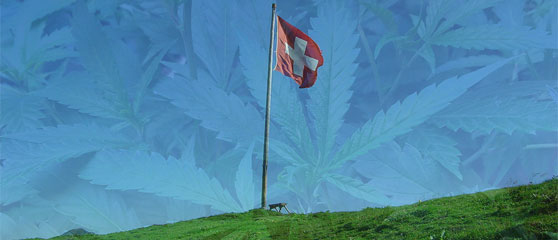A legal form of cannabis, C-Pure, is being bought, sold, and consumed in Switzerland due to an inadvertent legislative loophole – throwing into question the wider ability and purpose of policing cannabis.
C-Pure is legal under Swiss law as it contains less than one per cent THC (tetrahydrocannabinol), the main psychoactive constituent of cannabis. Dario Tobler, director of Bio Can AGOrganic – the company that created C-Pure – says that the product “has no intoxicating effect” because of its low THC content.
The legal loophole that allows for the sale of C-Pure occurred in 2011 when the Swiss Narcotics Act was amended; the legislation created an exemption from prohibition for cannabis with an average THC level of less than one per cent. This threshold was included so that fabrics and cosmetics could be manufactured from cannabis plants.
Under the current law, if police find an adult in possession of up to 10 grams of cannabis, they are required to fine them 100 francs (80 GBP), rather than arresting them. In 2015, there were a total of 18,366 fines across Switzerland.
Since C-Pure legally entered the market in August 2016, policing practices are being challenged, as law enforcement are unable to distinguish between legal and illegal cannabis from their appearances.
Michael Mosimann, who sells C-Pure from a headshop in Bern, told Der Bund that his customers had been complaining of police confiscating their cannabis; “our customers are upset, fair enough – they bought a legal product and even paid taxes on it”.
Zurich police spokesperson, Marco Cortesi, said that officers recognise the legal problem but cannot do anything about it. “The problem is that THC-levels are invisible to the naked eye”, he warned, so police will continue to confiscate anything that appears to be cannabis.
Anyone found by police to be in possession of C-Pure can have their cannabis returned to them if the low THC content of the product can be proven. The only way to do so is with a laboratory analysis – which members of the public can request.
If the analysis proves that the THC content is below one per cent, the cannabis will be returned, and the state will cover the costs of the analysis.
Police have recorded around a dozen cases of such C-Pure seizures since August 2016.
Christian von Wartburg, professor of narcotics law at the University of Bern, warns that this approach “is going to be very expensive … [as] every lab analysis which finds legal cannabis is done at the expense of the state”. He stresses that police must “come up with innovative practices”.
With a lifetime prevalence of 29.6 percent, cannabis is the most commonly used illicit drug in Switzerland. Despite this, the National Council refused to legalise it in 2004, and the public overwhelmingly voted against legalising personal cultivation and possession in a 2008 referendum.
If C-Pure, or other low-THC cannabis products, become more popular in Switzerland, policymakers may be compelled to further relax penalties for personal possession.


